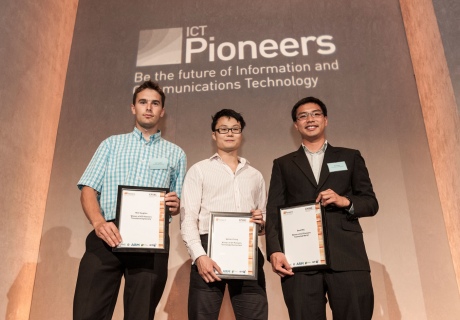DoC PhD Student Wins ICT Pioneers Competition

Nathan Chong a PhD student here in DoC becomes overall winner of the ICT Pioneers competition and winner of the Technology Everywhere category.
The ICT Pioneers competition recognises the most exceptional UK PhD students in ICT-related subjects who are able to communicate and demonstrate the excellence and exploitation potential of their research.
From a pool of 87 applicants, fifteen finalists were selected to showcase their research at the Engineering and Physical Sciences Research Council (EPSRC) Research Exhibition and Awards Ceremony, representing three categories. A winner was selected from each category: Nathan Chong for Technology Everywhere, Neil Vaughan (Bournemouth University) for Transforming Society, and David Wu (University of Southampton) for Connected World. Each winner was awarded a cash prize of £2,000. The competition featured two other Imperial finalists: Petr Hošek (Department of Computing) and James Bannock (CDT in Plastic Electronics).
Nathan Chong was selected from the three category winners as overall winner, and presented with an additional £1,000 prize by Professor Philip Nelson, Chief Executive of EPSRC, after pitching his research to a 'Dragon's Den'-style panel.
Nathan’s research involves Static Verification, which is concerned with the correctness of software. Static verification is about analysing programs and includes a spectrum of techniques from proving lightweight properties (such as the absence of data-races or buffer overflows) to full functional correctness. Nathan’s work focuses on lightweight techniques that are scalable and automatic, capable of analysing real-world programs without programmer assistance.
Nathan said, “My research is essentially about helping programmers write better programs. I want to live in a world where technology is everywhere but also where it is correct, reliable and safe. One promising way of attacking this problem is with static verification technology. GPUVerify, a tool that I have developed at Imperial College, is an example of a static verification technology that is starting to show its usefulness to industry.”
Professor Thomas Melham from the University of Oxford, who has pioneered the application of formal verification techniques in industry, attended the award ceremony. Professor Melham commented: "Static verification provides a new and uniquely capable way to improve the quality of the critical software systems we now rely on every day. Nathan Chong's EPSRC-funded research on GPU software verification is an outstanding example of how innovations in this technology can help make today's software systems safer and more reliable."
"These pioneering ICT researchers demonstrate why the UK is an excellent place to do research. Progress within ICT research will drive forward innovative technologies for the benefit of us all," said Professor Philip Nelson, Chief Executive of EPSRC.

Nathan Chong is a PhD student in the Department of Computing at Imperial College London, where he is a member of the Multicore Programming and Software Performance Optimisation groups, led by Alastair F. Donaldson and Paul H.J. Kelly, respectively. His research interests include parallel programming, computer architecture and formal reasoning, and he is particularly interested in specifications and problems at the hardware/software boundary. Nathan is a key contributor to GPUVerify, a verification technique and tool for the automatic analysis of GPU kernels. This work has been published at top conferences in programming languages and verification, disseminated in a wide-range of academic and industry tutorials, and recently won a HiPEAC award to aid the technology transfer of this research into industry. Nathan was an intern at Microsoft Research with the Programming Principles and Tools group in 2012. Prior to joining Imperial, Nathan was a researcher for ARM and worked on hardware and software at different levels of the system stack, including CPU virtualisation (now found in the ARMv7 architecture), cache coherence verification (now in AMBA4 ACE) and weak memory models. His work is supported by the FP7 CARP (Correct and Efficient Accelerator Programming) and EPSRC PSL (Particle Science Language) projects.
Nathan Chong’s homepage: http://www.doc.ic.ac.uk/~nyc04/
The GPUVerify project: http://multicore.doc.ic.ac.uk/tools/GPUVerify/
The Multicore Programming group: http://multicore.doc.ic.ac.uk/
Article text (excluding photos or graphics) © Imperial College London.
Photos and graphics subject to third party copyright used with permission or © Imperial College London.
Reporter
Press Office
Communications and Public Affairs
- Email: press.office@imperial.ac.uk
